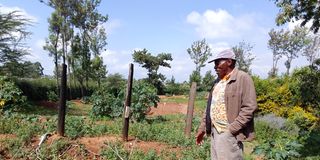Pyrethrum sneaks back to Nakuru decades later

Nakuru is slowly warming up to pyrethrum farming decades after farmers experienced huge losses from the crop.
Early 2023, the County Government of Nakuru secured a deal with an American firm Kentegra Biotechnology Limited, to set up a modern pyrethrum processing factory by the end of the year.
The firm started operations in Kenya after signing an investment deal worth more than Sh 498 million with the Kenyan Government in August 2017.
This news was received with a pinch of salt as a number of pyrethrum farmers had experienced great losses while planting the crop in the ‘90s.
Wilson Mwangi is a pyrethrum farmer in Nakuru’s Menengai East Ward who says the crop can go a long way in changing the livelihoods of Nakuru people and Kenya as a whole.

Wilson Mwangi has planted pyrethrum seedlings on his 15 acre piece of land in Engashura, Bahati.
Mwangi reveals to Mtaa Wangu that he has had passion for the crop having worked before at the Pyrethrum Board of Kenya.
His focus is in supplying pyrethrum seedlings to farmers, which he does through growing the same on his 15-acre piece of land at Kwa Wambura Engashura in Bahati sub county.
According to him, the farm can produce 13 million seedlings which he sells to cooperative societies at three shillings for each seedling just four months after planting.
“We can do a lot as a county if we revive this crop which has great potential in our economy,” he says.
On his part, Moses Gitonga- a farmer in Gilgil says, there is much that the county government needs to do in reviving the crop.

Moses Gitonga at his farm in Gilgil.
According to Gitonga, seedling supply is not enough.
“Let there be more field extension officers to assist the farmers. In doing so, we shall have revived pyrethrum,” says Gitonga.
Early July, Kentegra Biotechnology, embarked on the construction of an ultra-modern processing plant in Nakuru that will create 600 direct jobs.
Also Read: US based company to employ 600 Nakuru youth
Once completed, the factory is expected to process over 300,000 tonnes of pyrethrum by the end of this year and more than 750,000 tonnes by the year 2025.
Head of Field Operations and Farmers Services Micah Thuo says Kentegra seeks to increase the acreage in the Turi-Elburgon zone from 97 to 250 acres this year and has contracted a total of 7,000 farmers in the county with a total acreage of 1,500.
Several companies were also granted permits to extract, process, and sell pyrethrum products when the industry was liberalized seven years ago.
These are Africhem Botanicals, Pypro, and HighChem. The entry of private companies breaks the monopoly that was enjoyed by the State-owned Pyrethrum Processing Company of Kenya in Nakuru.
According to the County Government, most farmers have planted quarter acre holdings and in turn are paid Sh 200 per kilo of dried flowers hence improving their livelihoods.
The county government is also leading by training more extension workers and working closely with research institutions including Egerton University and Kenya Plant Health Inspectorate Service (Kephis) to ensure the dream is realized.
